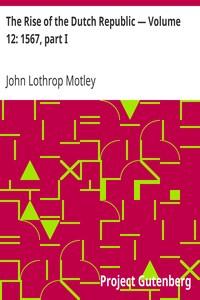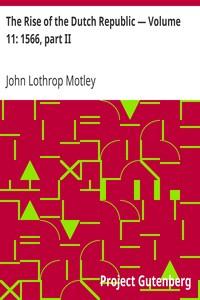|
|
Read this ebook for free! No credit card needed, absolutely nothing to pay.Words: 18955 in 4 pages
This is an ebook sharing website. You can read the uploaded ebooks for free here. No credit cards needed, nothing to pay. If you want to own a digital copy of the ebook, or want to read offline with your favorite ebook-reader, then you can choose to buy and download the ebook.

: The Rise of the Dutch Republic — Volume 13: 1567 part II by Motley John Lothrop - Netherlands History Eighty Years' War 1568-1648; Netherlands Church history@FreeBooksTue 06 Jun, 2023 Edition: 10 MOTLEY'S HISTORY OF THE NETHERLANDS, PG EDITION, VOLUME 14. THE RISE OF THE DUTCH REPUBLIC Continued dissensions in the Spanish cabinet--Ruy Gomez and Alva-- Conquest of the Netherlands entrusted to the Duke--Birth, previous career and character of Alva--Organization of the invading army-- Its march to the provinces--Complaints of Duchess Margaret--Alva receives deputations on the frontier--Interview between the Duke and Egmont--Reception of Alva by the Duchess of Parma--Circular letters to the cities requiring their acceptance of garrisons--Margaret's secret correspondence--Universal apprehension--Keys of the great cities demanded by Alva--Secret plans of the government, arranged before the Duke's departure--Arrest of Orange, Egmont, Horn, and others, determined upon--Stealthy course of the government towards them--Infatuation of Egmont--Warnings addressed to him by De Billy and others--Measures to entrap Count Horn--Banquet of the Grand Prior--The Grand Prior's warning to Egmont--Evil counsels of Noircarmes--Arrests of Egmont, Horn, Bakkerzeel and Straalen-- Popular consternation--Petulant conduct of Duchess Margaret-- Characteristic comments of Granvelle--His secret machinations and disclaimers--Berghen and Montigny--Last moments of Marquis Berghen-- Perfidy of Ruy Gomez--Establishment of the "Blood-Council"--Its leading features--Insidious behavior of Viglius--Secret correspondence, concerning the President, between Philip and Alva-- Members of the "Blood-Council"--Portraits of Vargas and Hessels-- Mode of proceeding adopted by the council--Wholesale executions-- Despair in the provinces--The resignation of Duchess Margaret accepted--Her departure from the Netherlands--Renewed civil war in France--Death of Montmorency--Auxiliary troops sent by Alva to France--Erection of Antwerp citadel--Description of the citadel. The armed invasion of the Netherlands was the necessary consequence of all which had gone before. That the inevitable result had been so long deferred lay rather in the incomprehensible tardiness of Philip's character than in the circumstances of the case. Never did a monarch hold so steadfastly to a deadly purpose, or proceed so languidly and with so much circumvolution to his goal. The mask of benignity, of possible clemency, was now thrown off, but the delusion of his intended visit to the provinces was still maintained. He assured the Regent that he should be governed by her advice, and as she had made all needful preparations to receive him in Zeland, that it would be in Zeland he should arrive. The same two men among Philip's advisers were prominent as at an earlier day--the Prince of Eboli and the Duke of Alva. They still represented entirely opposite ideas, and in character, temper, and history, each was the reverse of the other. The policy of the Prince was pacific and temporizing; that of the Duke uncompromising and ferocious. Ruy Gomez was disposed to prevent, if possible, the armed mission of Alva, and he now openly counselled the King to fulfil his long-deferred promise, and to make his appearance in person before his rebellious subjects. The jealousy and hatred which existed between the Prince and the Duke-- between the man of peace and the man of wrath--were constantly exploding, even in the presence of the King. The wrangling in the council was incessant. Determined, if possible; to prevent the elevation of his rival, the favorite was even for a moment disposed to ask for the command of the army himself. There was something ludicrous in the notion, that a man whose life had been pacific, and who trembled at the noise of arms, should seek to supersede the terrible Alva, of whom his eulogists asserted, with, Castilian exaggeration, that the very name of fear inspired him with horror. But there was a limit beyond which the influence of Anna de Mendoza and her husband did not extend. Philip was not to be driven to the Netherlands against his will, nor to be prevented from assigning the command of the army to the most appropriate man in Europe for his purpose. It was determined at last that the Netherland heresy should be conquered by force of arms. The invasion resembled both a crusade against the infidel, and a treasure-hunting foray into the auriferous Indies, achievements by which Spanish chivalry had so often illustrated itself. The banner of the cross was to be replanted upon the conquered battlements of three hundred infidel cities, and a torrent of wealth, richer than ever flowed from Mexican or Peruvian mines, was to flow into the royal treasury from the perennial fountains of confiscation. Who so fit to be the Tancred and the Pizarro of this bicolored expedition as the Duke of Alva, the man who had been devoted from his earliest childhood, and from his father's grave, to hostility against unbelievers, and who had prophesied that treasure would flow in a stream, a yard deep, from the Netherlands as soon as the heretics began to meet with their deserts. An army of chosen troops was forthwith collected, by taking the four legions, or terzios, of Naples, Sicily, Sardinia, and Lombardy, and filling their places in Italy by fresh levies. About ten thousand picked and veteran soldiers were thus obtained, of which the Duke of Alva was appointed general-in-chief. Ferdinando Alvarez de Toledo, Duke of Alva, was now in his sixtieth year. He was the most successful and experienced general of Spain, or of Europe. No man had studied more deeply, or practised more constantly, the military science. In the most important of all arts at that epoch he was the most consummate artist. In the only honorable profession of the age, he was the most thorough and the most pedantic professor. Since the days of Demetrius Poliorcetes, no man had besieged so many cities. Since the days of Fabius Cunctator; no general had avoided so many battles, and no soldier, courageous as he was, ever attained to a more sublime indifference to calumny or depreciation. Having proved in his boyhood, at Fontarabia, and in his maturity: at Muhlberg, that he could exhibit heroism and headlong courage; when necessary, he could afford to look with contempt upon the witless gibes which his enemies had occasionally perpetrated at his expense. Conscious of holding his armies in his hand, by the power of an unrivalled discipline, and the magic of a name illustrated by a hundred triumphs, he, could bear with patience and benevolence the murmurs of his soldiers when their battles were denied them. He was born in 1508, of a family which boasted, imperial descent. A Palaeologus, brother of a Byzantine emperor, had conquered the city of Toledo, and transmitted its appellation as a family name. The father of Ferdinando, Don Garcia, had been slain on the isle of Gerbes, in battle with the Moors, when his son was but four years of age. The child was brought up by his grandfather, Don Frederic, and trained from his tenderest infancy to arms. Hatred to the infidel, and a determination to avenge his father's blood; crying to him from a foreign grave, were the earliest of his instincts. As a youth he was distinguished for his prowess. His maiden sword was fleshed at Fontarabia, where, although but sixteen years of age, he was considered, by his constancy in hardship, by his brilliant and desperate courage, and by the example of military discipline which he afforded to the troops, to have contributed in no small degree to the success of the Spanish arms. In 1530, he accompanied the Emperor in his campaign against the Turk. Charles, instinctively recognizing the merit of the youth who was destined to be the life-long companion of his toils and glories, distinguished him with his favor at the opening of his career. Young, brave, and enthusiastic, Ferdinand de Toledo at this period was as interesting a hero as ever illustrated the pages of Castilian romance. His mad ride from Hungary to Spain and back again, accomplished in seventeen days, for the sake of a brief visit to his newly-married wife, is not the least attractive episode in the history of an existence which was destined to be so dark and sanguinary. In 1535, he accompanied the Emperor on his memorable expedition to Tunis. In 1546 and 1547 he was generalissimo in the war against the Smalcaldian league. His most brilliant feat of arms-perhaps the most brilliant exploit of the Emperor's reign--was the passage of the Elbe and the battle of Muhlberg, accomplished in spite of Maximilian's bitter and violent reproaches, and the tremendous possibilities of a defeat. That battle had finished the war. The gigantic and magnanimous John Frederic, surprised at his devotions in the church, fled in dismay, leaving his boots behind him, which for their superhuman size, were ridiculously said afterwards to be treasured among the trophies of the Toledo house.
The rout was total. "I came, I saw, and God conquered," said the Emperor, in pious parody of his immortal predecessor's epigram. Maximilian, with a thousand apologies for his previous insults, embraced the heroic Don Ferdinand over and over again, as, arrayed in a plain suit of blue armor, unadorned save with streaks of his enemies' blood, he returned from pursuit of the fugitives. So complete and so sudden was the victory, that it was found impossible to account for it, save on the ground of miraculous interposition. Like Joshua, in the vale of Ajalon, Don Ferdinand was supposed to have commanded the sun to stand still for a season, and to have been obeyed. Otherwise, how could the passage of the river, which was only concluded at six in the evening, and the complete overthrow of the Protestant forces, have all been accomplished within the narrow space of an April twilight? The reply of the Duke to Henry the Second of France, who questioned him subsequently upon the subject, is well known. "Your Majesty, I was too much occupied that evening with what was taking place on the earth beneath, to pay much heed to the evolutions of the heavenly bodies." Spared as he had been by his good fortune from taking any part in the Algerine expedition, or in witnessing the ignominious retreat from Innspruck, he was obliged to submit to the intercalation of the disastrous siege of Metz in the long history of his successes. Doing the duty of a field-marshal and a sentinel, supporting his army by his firmness and his discipline when nothing else could have supported them, he was at last enabled, after half the hundred thousand men with whom Charles had begun the siege had been sacrificed, to induce his imperial master to raise the siege before the remaining fifty thousand had been frozen or starved to death. Free books android app tbrJar TBR JAR Read Free books online gutenberg More posts by @FreeBooks
: The Rise of the Dutch Republic — Volume 12: 1567 part I by Motley John Lothrop - Netherlands History Eighty Years' War 1568-1648; Netherlands Church history@FreeBooksTue 06 Jun, 2023

: The Rise of the Dutch Republic — Volume 11: 1566 part II by Motley John Lothrop - Netherlands History Eighty Years' War 1568-1648; Netherlands Church history@FreeBooksTue 06 Jun, 2023
|
Terms of Use Stock Market News! © gutenberg.org.in2025 All Rights reserved.






